Japan to set sail for full-scale
peace diplomacy to the Middle
East (2)
NPO Salaam Association Chairman Ikuzo Kobayashi
From the Summer Issue of the electronic “Salaam Quarterly Bulletin”, No.33, May 2020
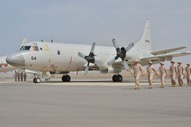
P3C Patrol Aircraft
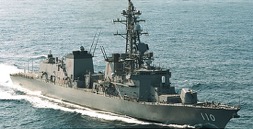
Escort Ship Takanami
On December 27, last year, the Cabinet decided to dispatch the Japan Maritime Self-Defense Force
to the Middle East. This is to ensure the safe navigation of Japanese vessels in the sea lane including the Straits of Hormuz. On January 11, two P-3C patrol aircraft and 60 members of Maritime Self-Defense Force departed from Naha Air Base for Djibouti. They will also engage in anti-piracy activities mainly in the Gulf of Aden off Somalia. Minister of Defense Kono instructed them to serve “with courage and pride.” The escort ship “Takanami” departed from Yokosuka Base in Kanagawa Prefecture on February 2, arrived in the northern part of the Arabian Sea on the 26th and started activities. 206 members of the dispatched unit including Captain Yosuke Inagaki, the unit commander are assigned to collect information based on “investigation and research.” I hope they can do their best because the situation is unstable. I just pray for their safety.
After the Gulf War, can Japan, which turned its direction to a journey for world peace by making international contributions, play the role of full-scale peace contribution again? We are entering an era in which Japan is tested whether it can meet the expectations of the world.
PKO Cooperation Law after the Gulf War
As detailed in the previous issue, Japan has spent 13 billion dollars out of the national tax revenue based on a legislation finally assed in the Diet in response to the Gulf War. However, the criticism from the US Congress “Too late. Too little”, and the absence of the Japanese
national flag in Kuwait’s newspaper advertisement made the fact painfully clear that, in the harsh situation of the war, support money alone was far from enough. Two months after the end of the Gulf War, a Maritime Self-Defense Force minesweeper was belatedly dispatched to the Persian Gulf. After confirming that there were no problems with the Constitution, the Self-Defense Forces Act, and legal issues, and after careful consideration, this decision was made. It was the first overseas dispatch since the establishment of the Japan Self- Defense Force
The late Diet member Kaoru Yosano testified, “We have thoroughly studied the United Nations Peacekeeping Operations (PKO) to promote human contributions.” And in June 1992, the United Nations Peacekeeping Operations (PKO) Cooperation Law was passed. After the end of the Cold War, the country made a historic shift “from single-country pacifism with an emphasis on economic prosperity and defense with light equipment to active international cooperation.”
Cambodia International Peace Cooperation Operations (1992-1993)
(from the website of the Secretariat of the United Nations Peace Cooperation Headquarters (PKO) of the Cabinet Office)
As the ceasefire monitor personnel, there were 8 persons each for the first (September 1992-March 1993) and the second (March-September 1993) were dispatched. 16 SDF personnel in total were dispatched. To support the implementation of the Constitutional Assembly elections held in Cambodia from May 23 to 28, 1993, 5 national civil servants, 13 local civil servants, and 23 civilians, — 41 people in total were dispatched to UNTAC.
Inspection of cargo by ceasefire monitoring personnel

Election staff
From October 1992 to July 1993, Japan dispatched 75 civilian police personnel to provide guidance, advice, and monitoring to the Cambodian local police. The Japan Ground Self-Defense Force’s facility unit composed of 600 people was dispatched each time for the first (September 1992-April 1993) and the second (March-September 1993) operations. A total of 1,200 people were dispatched. The main task of the facility units was repairing roads and bridges on National Highways 2 and 3 that were devastated by civil war, etc. Subsequently, at the request of UNTAC, water supply, refueling, food supply, Medical services, provision of accommodation facilities, transportation and storage of goods, etc. have been Although the risk of the world war subsided after the end of the Cold War, with the removal of control by two superpowers, the Soviet Union and the United States, rise of regional hegemony and nationalism due to different religions and cultures led to frequent conflicts. Conflicts in Eastern Europe, Africa, and the Middle East are such examples. On the other hand, the risk level of the East Asian region has increased as a potentially unstable region. Under such circumstances, Japan enacted 1)the United Nations Peacekeeping Operations (PKO) Cooperation Law in June 1992. Since then, the PKO activities that the Japan Self-Defense Forces have participated in have become activated in Cambodia, Mozambique, Golan Heights and East Timor. In addition, as a humanitarian international relief activity based on the PKO Cooperation Law, supply material transport activities for 2)relief of Rwanda refugees were also conducted. In this way, Japan’s international Contribution in collaboration with the United Nations has accumulated achievements and has been firmly established as a highly acclaimed international cooperation policy. While Japan’s international contribution was welcomed by the United Nations, it faced serious challenges. For example, the precious lives of a police officer and a UN volunteer dispatched to Cambodia, working outside the base were lost. A Japanese senior government official visiting the United Nations told the UN Secretary-General Boutros-Ghali about this. He then replied, “More than 1,000 people have died in peacekeeping forces.” The senior government official couldn’t say anything in response. He was reminded that Japanese common sense for peacekeeping operations would not pass. In addition, when Japan tried to dispatch 50 SDF members to the Golan Heights, the UN Commander of the Golan Heights (who was involved in the communication and supply for the troops who protect the ceasefire line between Israel and Syria) said, “We have to give a special treatment to the Japanese, so I don’t need them,” and “ If the Japanese die, it becomes a big deal, so it’s better to get troops from another country.” In response, the UN Headquarters said, “I can’t refuse because Japan, who pays 20% of the UN contribution, is telling us that they would dispatch troops,” and made him agree. Such a story was an unpleasant story in which the United Nations side had to give a special consideration for Japanese common sense regarding peace, despite the participation of the Japanese Self-Defense Forces in the United Nations peacekeeping force. Concerning peace activities, it means that Japanese common sense that was not applicable to the world was widely known in the world. On the other hand, in the case of dispatch of Rwanda refugee relief team, it was not dispatch as a unit of the United Nations but as a humanitarian relief activity led by Japan. The Japanese Diet held a heated debate over the armament of about 400 SDF soldiers to be dispatched.Predicting what would happen in the field activities was difficult even after the end of the civil war, and a mindset of leaving the solution after the end of conflicts to someone else increased uncertainty for the rescue operation itself. Too much restriction on the use of force may endanger the lives of the soldiers. Eventually, in addition to the conventional pistols and small guns that were carried On September 11, 2001, the United States was hit by Islamic extremist terrorist organization Al Qaeda in an unprecedented simultaneous terrorist attack. On September 12, 2001, the United Nations Security Council unanimously adopted 4)UN Security Council Resolution 1368. In the world that has experienced the horrific terrorism by the Islamic State, no one disagrees with the expression “war against terrorism” today, but the situation was different at that time. Especially in Japan, which is immersed in peaceful mood, the left-wing intellectuals and the media repeated selfish arguments that Japan should not be involved in wars, in terrorism, or the United Let me briefly touch on Usama bin Laden of Al Qaeda who was a mastermind of the 9/11 terrorist attacks. Although there were various factions involved in the anti-Soviet resistance movement in Afghanistan, they joined forces and forced withdrawal of the Soviet troops in February 1989. This resistance movement is generally called the Mujahideen struggle, but Usama supported mainly the Islamic party which inherited the ideology of the Jihad group (which was derived from the Muslim The United States has succeeded in overthrowing the Taliban regime in Afghanistan, but was unable to capture Usama bin Laden, mastermind of 9/11 terrorist attacks. Al-Qaeda formed the “International Islamic Front Against the Jewish and Crusade” in February 1998 under the joint name of Bin Laden and Zawahiri, and ordered that “Muslims have an obligation to kill the people of the The regime of Saddam Hussein continued after the Gulf War. Although UNMOVIC (an auxiliary body to It was certain that the military attack on Iraq did not get support in the form of a resolution of the UN Security Council, but Japan supported the decision of the United States and Britain regardless of a UN action. It was a natural choice for Japan. The disturbing actions of the Hussein dictatorship was an unfavorable for Japan, which relied on crude oil tankers whose operations are possible only when the Persian Gulf Sea Lane remains peaceful. Furthermore, it is certain that a lot of Al-Qaeda terrorists have moved into Iraq from Afghanistan and it is the worst possible situation that Iraq becomes a sanctuary of terrorists like Afghanistan. It can be said that Japan The battle between the US and Britain and the Iraqi regular army ended in 2003 December with the arrest of Saddam Hussein. The reality of Iraq was far from expectations for the democratization of Iraq in the United States. Immediately after the arrest of Saddam, the Saudi, Syrian, and Lebanese governments said that democratization of Iraq was out of the question, saying, “All we want is Iraq to be a country that does not invade our countries.” Egypt, Morocco and Kuwait were expecting a “state with which we can establish good economic relations”. In the Arab countries, it was thought that “democratization is to become a nation obedient to the United States” because of the deep-rooted feeling of distrust of the United States. The general view of Japan’s dispatch of Self-Defense Forces to Iraq was that “Japan feared the United States and succumbed to its pressure.” With such sentiment prevailing in Iraq, the confidence that the SDF won from the locals, albeit in the non-combat areas of southern Iraq, was surprisingly passionate. In the dispatch of the Self-Defense Force to Iraq, GSDF Colonel Masahisa Sato served as the commander of the team to support the first reconstruction operations. The first bridge built by the Self-Defense Force was named “SATO BRIDGE”. Taking advantage of his experience in PKO activities in Cambodia and the Golan Heights, he was affectionately nicknamed “Colonel Sato intimately familiar with heart of Samawa” by the tribe chief of the Samawa. Based on Security Council Resolution No. 1368, which was adopted following the 9/11 terrorist attacks on the United States, the United States led the efforts to conduct counter-terrorism operations against terrorists such as Al Qaeda and the Taliban, in order to prevent and deter international terrorism. In addition, security main-tenance activities near the border were implemented by 11 countries such as the United States, Britain, Canada and NZ. Furthermore, ships were inspected to interdict maritime movement of terrorists by 6 countries — the United States, Britain, France, Germany, Pakistan, and NZ. In this way, Japan was able to strengthen the Japan-US alliance over ten years after 9/11 terrorist attacks by cooperating in the United States’ fight against terrorism based on the UN Security Council resolution. Not only that, through refueling support activity, Japan participated in the interdiction of maritime terrorism by the United States, Britain, France, Germany, Canada, NZ, and Pakistan from the Indian Ocean to the Arabian Sea, contributed to international peace and security activities and earned recognition. Footnote 1) UN Peacekeeping Operations (PKO) Cooperation Law 2) Rwandan refugee relief 3) UNDOF (“United Nations Disengagement Observer Force” 4)United Nations Security Council Resolution 1368 5) Iraq Special Measures Law
Civilian police personnel

Facility unit
added, and the units eventually carried out a wide range of activities. International cooperation and SDF dispatch
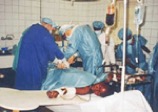
Saving many human lives by surgery
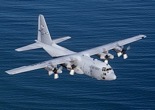
U.S. Air Force C-130E: Airborne Dispatched Unit engaged in transport task by a C-130 airplane from Nairobi to Goma
Common sense of Japan not acceptable in the world highlighted
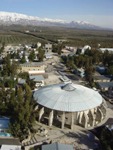
Fauar Encampment where a 3) UNDOF (“UN Disengagement Observer Force” deployed in the Golan Heights in the southwestern area of Syrian Arab Republic of the Middle East) command post is located
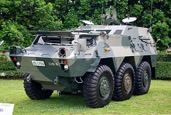
Type 82 command and communication vehicle: A wheeled armored vehicle that was first put into practical use in Japan after World War II. It is used by the Japan Ground Self-Defense Force, and has been deployed since 1983 mainly to divisional headquarters, infantry regiment headquarters, and special operation regiment headquarters. (From Wikipedia)
during the previous dispatch, one machine gun and one Type 82 command and communication vehicle were approved for them to carry.
If someone conducts relief activities in the field where people die, shed blood and become refugees in a civil war, the Japanese “standard for the use of force and weapons” is too abstract to be applicable. It became clear that legal arrangements applicable to the reality of
the world are necessary. They remain as a political responsibility.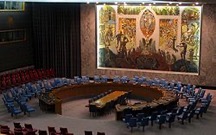
Meeting Hall of the United Nations Security Council
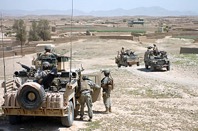
Afghanistan Conflict
9/11 terrorism that shook the world

A catalogue of relief supplies for Afghanistan refugees has been handed by Prime Minister Koizumi
(Director, International Peace Cooperation Headquarters)to UNHCR Japan-Korea Regional Representative Rochanakorn
US President W. Bush declared a “war on terrorism” and launched an attack on Afghanistan ruled by the Taliban regime that conceals Bin Laden based on a resolution of the Security Council.
At the request of the United States, Prime Minister Koizumi immediately enacted the “Special Measures Against Terrorism Law.” In October, relief supplies for Afghan refugees were delivered to Pakistan by Air Self-Defense Force transport aircraft.
This special measures law was a legislation valid only for two years, but it made it possible to dispatch the Self-Defense Forces in “wartime”, dispatch to remote countries, and “dispatch for guard activities” in anticipation of terrorism at US military bases in Japan. Although a dispatched unit does not participate in combat, it made possible for the unit to undertake actions naturally expected as a US ally based on a Security Council resolution.Al-Qaeda that promoted global terrorism
States was victimized by terrorism because it volunteered to serve as a policeman of the world.However, after the end of the Cold War, problems different from the past were occurring in the Middle East and Near East. 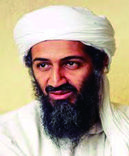
Usama bin Laden
In December 1978, the Soviet Union initiated a military intervention in Afghanistan and established a Communist as the country’s resident. The Islamic tribes opposed to this and started the guerrilla fight at once. Usama, who had just graduated from university at that time, had already joined the Muslim Brotherhood. He followed Abdulla Azzam, a university professor who was also a member of the Brotherhood as his mentor, and became committed to the goal of the realization of an Islamic society in which the Koran is strictly applied. He was greatly inspired by the progress of the Iran-Islamic Revolution, and at the invitation of Azzam, he decided to fight against the Soviet Union as a Mujahideen in Afghanistan.
Close to the Saudi royal family, he obtained a mandate from Prince Faisal who was Saudi Arabian General Intelligence Agency (GPI) Director and recruited Mujahideens from Egypt and Sudan with the funds from Faisal and his personal resources. He deepened his relationship with Omar Abdul-Rahman (mastermind of the WorldTrade Center terrorism incident in 1993 and incident at Luxor in Egypt in 1997) and Zarqawi (who founded Al-Qaeda in Iraq in 2002, which was the predecessor of the
Islamic State) around that time.
Omar Abdul-Rahman: The spiritual leader of the Islamic Group (Al-Gamaa-Al-Islamyah) and the mastermind of the World Trade Center bombing incident and Luxor incident.
Brotherhood and was involved in the assassination of President Sadat).
Usama founded Al Qaeda in August 1988. Immediately after the Soviet troops withdrew, he turned to anti-US activities and was involved in supporting Islamic forces in the Yugoslav and Balkan conflicts. He opposed stationing of U.S. troops in his own country, Saudi Arabia during the 1990 Gulf Crisis. After his argument was dismissed by King Fahad and Prince Saud, then Defense Minister at the time, he left Saudi Arabia for Sudan and deepened his relationship with Ayman Zawahiri.
Starting with the hotel bombing in Aden, Yemen in 1992, he conspired with Omar Abdul-Rahman to carry out the World Trade Center Building underground bombing in 1993 and involved in a series of indiscriminate terrorist activities that caused causalities in the general public around the world.
He was involved in the bombing of the US military bases in Saudi Arabia in 1996, and he supported the Islamic Group financially which carried out the Luxor incident in 1997. Following the bombings of the US embassies in Kenya and Tanzania in 1998, and the attack on the American ship Cole off Yemen in 2000, the simultaneous terrorist attacks on the United States were carried out.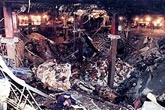
Underground parking destroyed in the World
Trade Center bombing in February 1993
Iraq war
United States and its allies.” Al-Qaeda’s Supreme Commander’s order was instructions to members for action. Moreover, since this organization has built up a network of international terrorism, the threat of terrorism remained unchanged due to the failure to capture Usama, and the possibility of transfer of weapons of mass destruction to terrorist networks such as Al Qaeda posed a global threat.
Due to the loss of Al-Qaeda’s base in Afghanistan, the countries to which Ai-Qaeda could possibly relocate were Pakistan, Iran, Iraq, Yemen, and African countries. The most suspected country was Iraq. 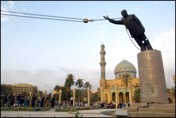
assist implementation of Security Council resolutions, which continuously monitored, verified, and inspected Iraqi weapons of mass destruction, namely biological and chemical weapons, ballistic missiles) established in 1999, and IAEA (International Atomic Energy Agency) conducted investigation on Iraq, the Iraqi declaration was said to be false. So the United States and Great Britain decided to attack Iraq without a Security Council resolution.
Looking back on the emergence of the ISIS, the “Islamic State” in Iraq, it can be said that the “war on terrorism” was a legitimate decision that could stand the evaluation of history. But what about the Iraq War?
It is a fact that Iraq’s weapons of mass destruction were never found during the Iraq war, and even though the fear of their transfer was long gone, destruction brought to the country through the war remained questionable. However, if we ask for a reflection, it is necessary to discuss what kind of possible solution there was, including a solution to the problems of the members of the Security
Council and the dictatorship of Hussein in Iraq. Answer to such question cannot be easily obtained.Japanese Decision =
Iraq Special Measures Law which turned out to be correct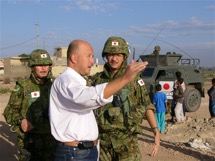
Situation at the time of dispatch to Iraq
was right to support the US and British attacks on Iraq. This decision by Japan sent a strong message of support for the Bush administration in the United States, and it earned the strong trust
of the United States.
When the battle against the Iraqi government troops ended, the United States requested then Prime Minister Koizumi, “The US military is working to maintain the security of Iraq, but we would like the Japanese Self-Defense Forces to help.” The Koizumi administration immediately responded by enacting 5)the Iraq Special Measures Law. It allowed a dispatch of the Self-Defense
Forces to support the reconstruction of Iraq. The SDF built a camp in Samawa, a non-combat area in the south, and carried out tasks of food and medical assistance, building restoration, and fuel and water supply to the US military.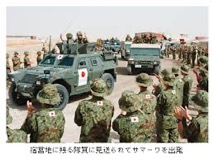
Departing Samawa as unit soldiers remaining at the encampment saw them off
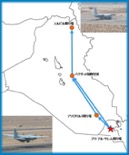
Ali Al-Salem Air Force Base in Kuwait, which became the deployment base of the Japan Air Self-Defense Force
Iraqi situation
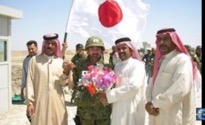
JGSDF Colonel Masahisa Sato (center)
Fighting terrorism and refueling in the
Indian Ocean
Japan decided to not participate in the main maritime interdiction activities, and instead to carry out supply support activities for ships of various foreign countries engaged in anti-terrorism maritime interdiction activities based on the Special Measures Law for Supply Assistance.
Maritime refueling must be carried out stably over a long period of time while a Japanese supply ship accompanies a foreign vessel engaged in marine interdiction activities. The Japan Maritime Self-Defense Force with equipment, high technology and ability is the most suitable, and its activities were able to receive high evaluation and appreciation from each country.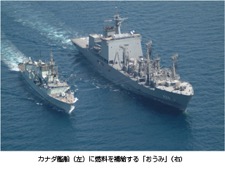
Oumi (right) supplying fuel to a Canadian ship (left)
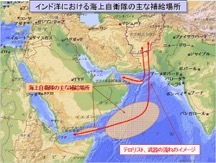
The Japan Maritime Self-Defense Force has supported maritime interdiction
activities by supplying fuel and water at sea so that ships engaged in efforts to
prevent international terrorism can continue long-term activities without calling
in ports frequently.
(Continue)
There are five principles for participating in PKO, and they stipulate that Japan alone can withdraw if three conditions including 1) that the parties to the dispute have reached a ceasefire agreement, 2) that the parties to the dispute agree to the dispatch of PKO units, and 3) the strict adherence to a neutral position — are not met. The use of weapons would be limited to the minimum necessary to protect personnel. However, regarding the provision that “weapons would be limited
to the minimum necessary to protect the life of personnel, etc.”, it was pointed out that there was a deviation from the actual situation. In case troops of other countries are attacked at present time, weapons usage standards have been relaxed, such as a “rush-and-guard” permit that allows them to be rescued.
A large number of refugees who had fled to neighboring countries due to the civil war in the Republic of Rwanda were in a very dire situation with many deaths due to the spread of cholera and dysentery. At the request of the United Nations Office of the High Commissioner for Refugees (UNHCR), Japan dispatched Self-Defense Force units to Goma in the Republic of Zaire (now the Democratic Republic of Congo) from September to December 1994 (September to December 1994), to carry out relief activities in the field of medical care, epidemics prevention, water supply, air transportation, etc. as the first cooperation efforts for “humanitarian international relief activities” based on the International Peace Cooperation Law. (From the website of the Secretariat of the International Peace Cooperation Headquarters)
deployed in the Golan Heights in the southwestern part of the Syrian Arab Republic in the Middle East) Since February 1996, Japan has dispatched personnel and Self-Defense Forces units to the “United Nations Disengagement Observer Force (UNDOF)” deployed in the Golan Heights in the southwestern part of the Syrian Arab Republic in the Middle East, and engaged in command center activities and rear-support operations such as transportation. However, in December 2012, Japan completed the activities of the units of the Self-Defense Force and command personnel of UNDOF, and
by February 2013, Japanese personnel have returned to Japan. (From the website of the Secretariat of the International Peace Cooperation Headquarters)
UN Security Council Resolution 1368 stipulates in the preamble that the individual rights of individual or collective self-defense of the United States victimized by the terrorist incident and its allies are recognized in response to the terrorist attacks against the United States on September 11, 2001.
“Special Measures Law Concerning Implementation of Humanitarian Reconstruction Support Activities and Security Assurance Support Activities in Iraq” (Iraq Special Measures Law): The pillars of
activities are humanitarian reconstruction support activities and security assurance support activities. Activities were limited to “noncombat areas” but units were dispatched to areas where there was controversy as to whether they were combat areas. The Self-Defense Force was dispatched from December 2003 at the beginning of the Iraq War to February 2009. (From Wikipedia)
